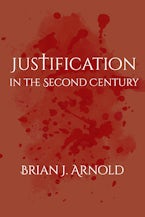T. F. Torrance’s influential The Doctrine of Grace in the Apostolic Fathers (1948) relegated the collection of Christianity’s earliest noncanonical witnesses to a fall from grace. According to Torrance, the Apostolic Fathers abandoned Paul’s "justification by faith" and instead advocated for various forms of "works righteousness."
Given the new perspectives on both Paul and first-century Judaism, Brian Arnold challenges Torrance’s judgments of the Apostolic Fathers by assessing the clarity, prevalence, and importance of Paul’s doctrine of justification one hundred years after Paul’s death (ca. 165 CE). Arnold carefully examines the ancient writings of Clement of Rome, Ignatius of Antioch, and Justin Martyr, as well as the Epistle to Diognetus and the Odes of Solomon, providing close readings of key texts. Arnold concludes, contrary to Torrance, that Paul’s teaching on justification is present, understood, and important in second-century writings. Arnold opposes arguments that claim the Early Church Fathers either misunderstood Paul or were uninterested in the doctrine. Arnold shows that Christianity, in its earliest practices, emphasized the virtuous life that must follow one’s baptism, while also contending that faith is the only prerequisite for justification.
While second-century Christian literature may not mimic Paul’s language at every point, Arnold shows that the essence of Pauline soteriology--the liberation and new life that faith in Christ’s atoning death provides apart from law--continues to be a dominant theme of Christian reflection, praxis, and worship.

